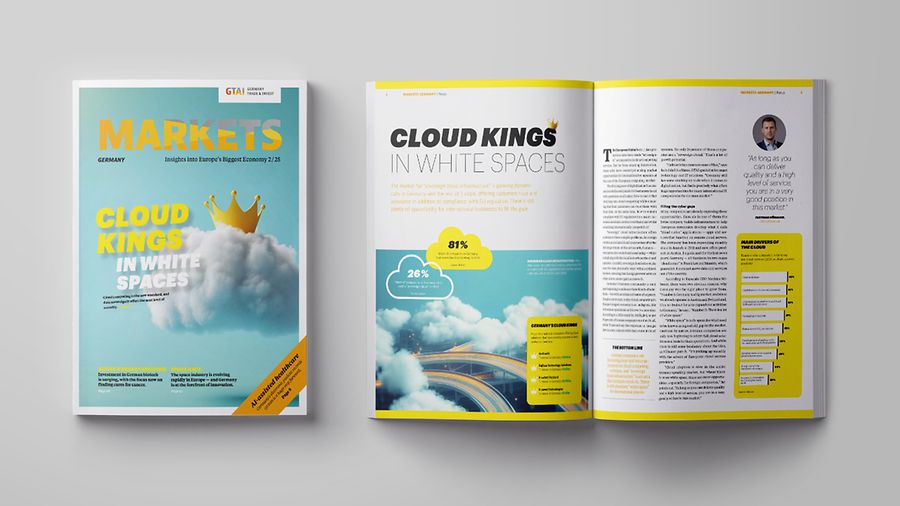
Markets Germany Magazine 2/25 | Manufacturing
Building Material Resilience
The European Union’s Critical Raw Materials Act aims to secure the supply of strategically important raw materials and reduce dependence on third countries. Dirk Schöps from the German recycling network REWIMET discusses the opportunities this creates for companies in the EU, particularly in Germany.
Sep 04, 2025
Mr. Schöps, how does the recently enacted Critical Raw Materials Act (CRMA) help secure Europe’s supply of essential raw materials?
Dirk Schöps: The CRMA establishes a common framework across the European Union (EU) to ensure a stable supply of strategically important raw materials. Different stakeholders play distinct roles: The EU sets the objectives, while member states implement them at the national level by adapting legislation and introducing financial incentives. These measures will influence corporate decision-making in the coming years as businesses adjust to the new regulatory landscape and capitalize on emerging opportunities. The three key areas of focus are domestic extraction of primary raw materials, refining and processing, and recycling of critical raw materials. The EU’s overarching goal is to reduce reliance on outside countries and establish a resilient raw material supply chain within the bloc.
What opportunities are there for companies to do business?
DS: First, the CRMA provides clear strategic direction for EU member states, allowing businesses to align their operations with these objectives. This creates new business opportunities, particularly in recycling, sustainable extraction methods and innovative material processing. Second, the CRMA facilitates financial support for sustainable technologies through EU and national funding programs. Third, streamlined approval processes improve the regulatory environment for companies. Early adopters of these developments can position themselves as technology leaders and gain a competitive edge in growing markets.

This article was published in issue 2-2025 of the Markets Germany Magazine. Read more articles of this issue here
Which industries stand to benefit most from the CRMA?
DS: The CRMA presents significant opportunities for companies involved in raw material extraction, processing and refining within the EU. Industries that rely heavily on critical raw materials — such as the automotive, battery and electronic sectors — will also benefit. These industries need materials like lithium, cobalt, nickel and rare earth elements. By stabilizing supply chains within the EU, the CRMA aims to reduce price volatility and enhance the global competitiveness of European businesses.
What CRMA targets are particularly relevant for companies engaged in raw material extraction and recycling?
DS: One key CRMA objective is to achieve a minimum recycling rate of 25 percent for strategic raw materials. Additionally, approval processes for projects will be significantly expedited: Mining projects must receive approval within 27 months, while recycling and processing projects will have a maximum approval period of 15 months. This acceleration enhances planning certainty for businesses and facilitates the efficient development of sustainable raw material cycles. The CRMA therefore provides strong incentives for investment in modern recycling technologies, contributing to the establishment of a circular economy in Europe.
Circular Economy Strategy to Boost Growth and Jobs
The National Circular Economy Strategy (NKWS), adopted in December 2024, aims to increase raw material reuse, minimize waste and strengthen Germany as an industrial location. The strategy covers the entire product lifecycle, from design and production to use, reuse, and recycling. A key emphasis is on fostering innovative recycling technologies, with digitalization playing a crucial role.
The overarching goal is to reduce Germany’s reliance on raw material imports, aligning with EU objectives, particularly the CRMA’s focus on securing strategically important industrial materials. The Federation of German Industries (BDI) and consultants Deloitte predict that the circular economy will boost Germany’s annual GDP by 12 billion euros and create around 120,000 new jobs by 2030.
What role does REWIMET play in advancing the CRMA’s objectives?
DS: REWIMET is a network of companies, research institutions and municipal stakeholders from various regions across Germany — all dedicated to developing innovative recycling technologies and integrating them into industrial applications. We support the entire innovation pipeline, from basic research to practical implementation, helping companies establish sustainable and efficient material cycles. Additionally, we connect businesses with useful research partners to drive technological advancements and unlock new market opportunities.
Why does the CRMA make Germany an attractive location for international companies?
DS: Germany is a leader in raw material processing, with a highly efficient steel and metal industry. It also boasts a strong research ecosystem that fosters innovation in raw material supply solutions. This combination of industrial infrastructure, technological expertise and government support makes Germany one of the most attractive destinations for investments in raw material security and sustainable materials management. International companies find excellent opportunities for collaboration and strategic partnerships here.
Dirk Schöps is Cluster Manager of the German recycling network REWIMET at the Institute of Mineral and Waste Processing, Recycling and Circular Economy in Clausthal.
Investment Momentum Driven by the CRMA
The Critical Raw Materials Act (CRMA) is already driving business in Germany. Michael Waitz, Head of Metals & Mining at KfW IPEX-Bank, has seen this trend firsthand: “Over the past 24 months, we have observed a sharp rise in financing requests from companies in raw material extraction and recycling.”
KfW IPEX-Bank, a subsidiary of the state-owned KfW economic development bank, specializes in export and project financing. It provides medium- and long-term financing at market conditions for exports, infrastructure projects, environmental initiatives, climate protection measures and raw material security projects.
The KfW also manages the German government’s raw materials fund. It supports strategic mining, metal processing and recycling projects. It supports strategic mining, metal processing and recycling projects, and aims to secure Germany’s raw material supply and reduce dependence on imports.